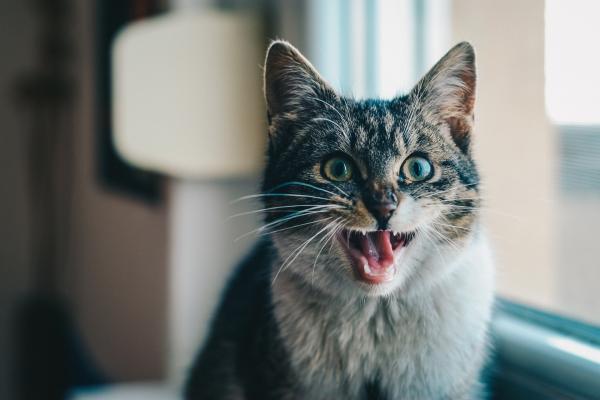My Cat Keeps Making Choking Noises



See files for Cats
If we see our cat coughing and wheezing, our mind can jump to many conclusions. The intensity and frequency of the choking sounds from our cat will determine how panicked we may be, but it's important to know something is causing it. Whether this is something we need to be worried about will depend on the other symptoms the cat exhibits. We also need to think carefully about what our cat may have been doing to get in this coughing, choking or wheezing situation.
A cat hacking or making gagging noises has various causes which can lead to serious problems if left unattended. AnimalWised looks into why your cat keeps making choking noises to help you know if you have an emergency on your hands (and what to do about it).
Is your cat hacking, choking or gagging?
Vocalization is an important aspect of our cat's interaction with their human companions. In fact, cats will generally only meow at humans and not their fellow felines. However, among the sounds cats make toward their human pals, coughing, choking or wheezing are abnormal. Knowing what is an abnormal sound in your cat involves getting to know them and understanding their healthy vocal expressions. Each cat is unique in this regard, but getting to know your cat well is part of the rewarding experience of living with a pet.
The type of sound the cat makes will help determine the cause of the problem. You will need to see how severe it is, whether it sounds dry or wet and whether it is accompanied by any substances. With a cat hacking, itis usually a sound to indicate choking, but the cause of the choking might vary. A cough might sound like it is hacking, but it doesn't necessarily mean a foreign object is present. Gagging is choking, but it will usually be quite an immediate problem and will lead to asphyxiation without proper intervention.
You need to think about whether they have eaten anything recently as this can provide a clue to the cause of choking or coughing. You should also consider if there is anything you have left out which may have been consumed accidentally. In general, look for any change or factor in their environment or behavior which may help diagnose the problem. Unless the problem is obviously not an immediate danger, you should take your cat to the vet to determine the cause of the hacking or choking.

My cat acts like something is stuck in her mouth
When a cat makes a hacking or choking noise, it is possible there is something stuck in their mouth or throat. What this might be is something related to what they have consumed. How they behave will help give us clues as to what it is which might be stuck. The two main choking hazards are:
Hairballs
Anything which gets stuck in the gastrointestinal system is known as a bezoar. Hairballs are a type of bezoar which occur when a cat ingests hair when they groom themselves. Most cats will shed throughout the year, but will molt significantly twice annually. During these times, it is possible the cat will ingest more hair than usual leading to hairballs. As the hair collects in the gastrointestinal system, it will form a wet mass mixed with phlegm.
When coughing up a hairball, the sound will be less hacking and will sound like regurgitation. When the hairball is expelled, it will sound like it is vomiting rather than coughing. You will also see the cat sticking their tongue out as they try to bring up the hairball. They may drool a little before the hairball appears. Once the hairball has been produced, any choking noises should stop. Some hairballs will take longer than others to appear.
If you want to prevent hairballs, it is imperative you groom your cat regularly. Many domestic cats will need help, particularly longhair breeds which do not have another cat in the house. Malt paste may also be used to help aid digestion of hair or ease regurgitation. Hairballs are normal for a cat, but if they have ingested too much it can lead to a trichpbezoar. These can get stuck further down the digestive tract and can be dangerous. They are rare and they probably won't be accompanied by choking.
Foreign objects
While a hairball might be temporarily uncomfortable, they will usually not cause harm to the cat. If your cat is coughing and wheezing, but no hairball is present, it will likely be a foreign object. These are a different matter. If the cat ingests something they shouldn't have, the result may be a choking hazard. If the foreign object is small enough, it may pass through their digestive system. If it is too large to pass, it can get stuck in the throat or mouth.
If your cat has something stuck in their throat, then you may see them look like they are yawning a lot. They are probably trying to get the object out rather than being tired. They also may grind teeth a little to dislodge to object.
If the object is in the mouth, then you should be able to see it. The cat should be able to expel it themselves unless it is stuck or they are too weak to do so. If it is stuck at the back of the throat (top of the esophagus), then it might be that air can still pass. The cat may be agitated, but they are not necessarily in immediate danger. If the object is blocking their airway, it needs to be dislodged immediately.

What to do if your cat is choking on something
An emergency situation is happening if your cat is choking on something which is blocking their airway. The first thing you should do is open their mouth and see if there is anything visible which you can remove. If you see it and you can reach it with your fingers, remove it. If you can see the obstruction, but are unable to reach it, you may need tweezers to latch on to the object. Ideally, this should be done by a professional, but this is what to do in an emergency.
When you are sure they are choking, but cannot see the obstruction, you will need to perform the Heimlich manoeuvre on the cat. To do this:
- Hold the cat with their back against your chest and make a fist with one of your hands.
- Place the fist under the cat's rib cage and hold it with the other hand so that you belt around their body.
- Pull in and upwards in sharp motions.
- Repeat these abdominal thrusts until you hear the object being removed.
- Look into their mouth after two or thee abdominal thrusts to see if you can remove the object yourself.
- Repeat until the obstruction is dislodged.
If you have had to do the Heimlich manoeuvre on your cat, you will need to take them to the vet afterwards. This is so that they can see if all of the obstruction has been removed as well as check if any damage has occurred during the experience.
The types of obstruction are often food related as cats don't often try to eat things which do not look appetizing to them. If they have been given cooked poultry, the cooked chicken bones might get stuck in the cat's mouth. Fish bones similarly cause choking hazards. Small bones may cause the cat to make hacking noises as they try to dislodge them. If their airway is not blocked, they may simply need a little time to do this on their own.
You will need to take the cat to the vet if the obstruction is not an emergency situation. There they will diagnose the problem. You should tell them everything you can about the circumstances to help in this diagnosis. If the object is near the top of the throat, they may use an endoscopy to both confirm its presence and remove it with the grips at the end of the endoscope.
If the obstruction is further down, the vet will need to perform an x-ray and or ultrasound to determine what the object is and how to treat it. If the object can pass through the rest of the gastrointestinal tract, but cannot be removed from the mouth, a vet may try to push it into the stomach. If not, surgery may be required. If it is not obvious what the obstruction is, do not remove it yourself. It could be a long piece of string or something with a sharp edge. If this is the case, pulling it out manually may cause internal tissue damage.

My cat keeps coughing, but nothing comes up
If you cat keeps making choking noises, but you are sure there is no hairball or foreign object, the cough may be due to one of the following causes:
- Asthma: cats with asthma may make noises which sound very similar to choking or coughing. Feline asthma is one of the most common respiratory diseases in cats[1], affecting about 1% if the population. When an asthma attack occurs in a cat, their lungs will become inflamed, constricting them and making it much harder to breathe. Mild asthma attacks in cats might lead to slight coughing, but an acute attack will require you to take them to a veterinary hospital. You should not smoke around your cat in general, but particularly around a cat with asthma.
- Congestive heart failure: if a cat suffers from heart problems, then coughing may be a symptom. This will likely see coughing happening over a longer period of time. If a heart attack occurs, it may be one of the symptoms, but the others will alert you to an emergency. Some reports find that drugs such as spironolactone can be used to treat cardiomyopathy (heart disease) in cats[2]. Annual or biannual veterinary checkups should be carried out to check vitals such as heart function. Filairiasis is a disease affecting the heart caused by the parasite known as heartworm. This is zoonotic, i.e. it can be passed on to humans[3].
- Infection: if you cat has been infected by a disease or infested by a parasite, choking sounds may be a symptom. The type of infection will manifest particular symptoms, but those which lead to respiratory inflammation often lead to coughing or retching sounds. Lungworm is a particularly nasty parasite which can cause coughing in a cat. A recent report shows that although “visualization of the nematode [lungworm]... in fecal and respiratory (bronchial mucus or pleural fluid) samples” has been used as the main type of diagnosis, more sophisticated diagnostic tests are being developed[4]. treatment will need to be carried out by a veterinarian, but proper deworming is essential for prevention.
- Allergies: while we may think more about cats affecting human allergies, cats are also susceptible to suffering an allergy. This may be due to food, plant matter (including pollen), cleaning products, fabrics or drugs. The things cats can be allergic to are similar to humans. Symptoms include wheezing, coughing and sneezing which may sound like choking noises in cats. Take your cat to the vet to test for allergies and to rule out any other pathologies.
This article is purely informative. AnimalWised does not have the authority to prescribe any veterinary treatment or create a diagnosis. We invite you to take your pet to the veterinarian if they are suffering from any condition or pain.
If you want to read similar articles to My Cat Keeps Making Choking Noises, we recommend you visit our Other health problems category.







